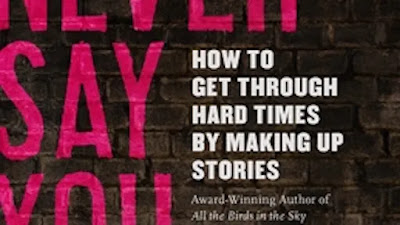Charlie Jane Anders’ writing craft book Never Say You Can’t Survive isn’t a philosophy book, except that, well, take a look at this. Here, she talks about how characters can change. As writers and readers, we view their fictional world from the outside, and we also see that they have free will. Maybe we see things about the characters that they aren’t aware of about themselves. When the character has fewer options, they — and we — might perceive their situation as worsening. Still, despite their limited options, the character can change. Almost always, a breakthough is possible.
Here are three brief passages from the book:
Fiction can work all kinds of magic during horrendous times: inspire us to resist evil, expose the reality of the world, create empathy, and help us to understand complex systems from a vantage point that could be hard to reach in nonfiction. But the most powerful thing that fiction can do is show that people can change, and that we all have the potential to be different. That’s where I get a lot of my hope when everything around me feels hopeless.
* * *
Almost every story is some mix of character stuff and plot stuff, and the mix can vary from page to page and chapter to chapter. Character is action: people aren’t just a collection of feeling and opinions and habits, but rather the sum total of all the choices they take. Meanwhile, even the plottiest plotfest needs to have characters who we root for, or else none of the secret codes and countdowns will matter worth a damn.
* * *
I increasingly find it helpful to think in terms of ‘options become constrained,’ rather than ‘things get worse.’ It’s not so much that the situation deteriorates — it’s more like doors are slamming shut, and the protagonists have fewer and fewer courses of action open to them.
— Charlie Jane Anders, Never Say You Can't Survive: How to Get Through Hard Times by Making Up Stories, Tordotcom (2021), Chapters 8, 9, 10
I appreciate philosophy wherever and in whatever format it appears.
Previously published July 8, 2022 to the Episyllogism blog. That blog is offline, so now this article is here.
I'd like to add this sentence from Benjamin Harnett's novel The Happy Valley (Serpent Key Press, 2022): "He then had what I'd call an accidental recovery — some people do everything right and still tumble into the abyss, others tumble into the abyss and then one day you find they have stepped up out of it, on the far side, wholly sound."
See also Philip Kinsher's 12 Character Archetypes to Know Before You Start Writing, BookBaby, July 11, 2023. These roles are:
- The hero
- The villain
- The mentor
- The trickster
- The guardian
- The herald
- The shape-shifter
- The sidekick
- The love interest
- The underdog
- The femme fatale
- The jester


No comments:
Post a Comment